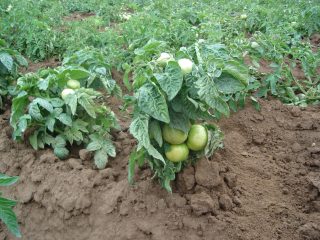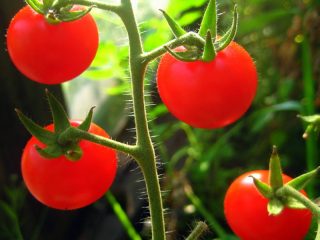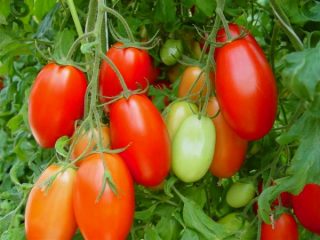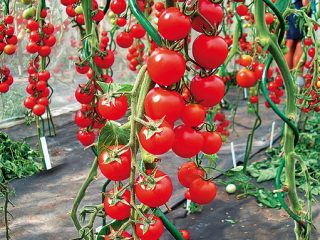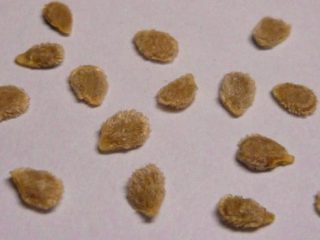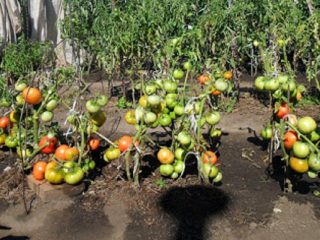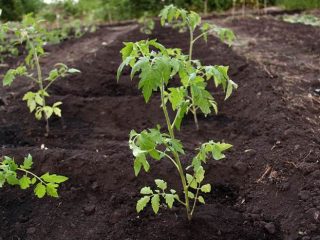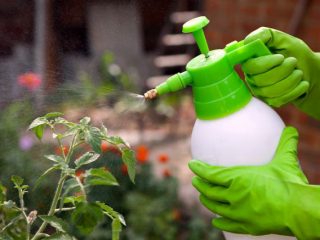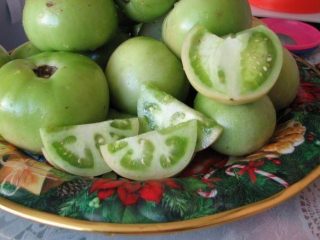Content
Promising tomato varieties of Russian and foreign selection appear every year. This category also includes the Sofa F1 tomato, which went on sale in 2020. Gardeners do not yet have much experience in cultivating it, but the new product seems very promising and promising.
History of selection
Tomato Sofa F1 is a hybrid bred by Russian breeders. The originator is the agricultural firm Partner, which has long been well known to amateur gardeners. Seeds have only recently appeared on the market. Therefore, it is obvious that the hybrid is not yet listed in the domestic State Register of Breeding Achievements. It is also unknown whether the application required for registration has been submitted, and whether this is in the plans of the originator.
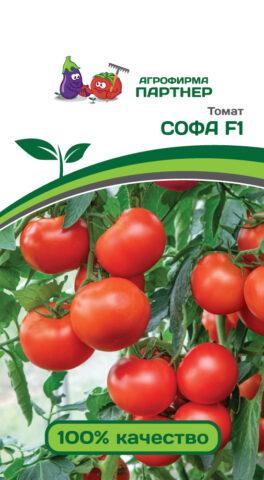
Sofa tomato seeds are produced by the only agricultural company that is the originator
Description of the tomato variety Sofa F1
Sofa F1 is an early ripening tomato hybrid. Only 80-85 days pass between the emergence of seedlings and the collection of the first fruits that have reached full ripeness.
Sofa tomato bushes are determinate, “squat”, with a powerful stem, relatively compact. The growth of their central shoot is limited by the height “set” by the breeder. In open ground it is 0.9-1 m, in a greenhouse it is 15-20 cm more. The foliage is medium, the leaf blades are medium-sized, with a “carved” shape typical of tomatoes.
Most tomatoes weigh 80-100 g. In size, Sofa F1 is a cross between cherry and cocktail tomatoes. Occasionally, larger specimens weighing 120-150 g are found. The skin is glossy, thin, but elastic and durable, deep red in color. The color is uniform, without a light spot at the stalk.
The pulp is very juicy and tender, fine-grained when cut, with a pronounced “tomato” aroma. The fruits have 3-4 seed chambers, and there are very few seeds in them. They are small and almost unnoticeable when eaten.
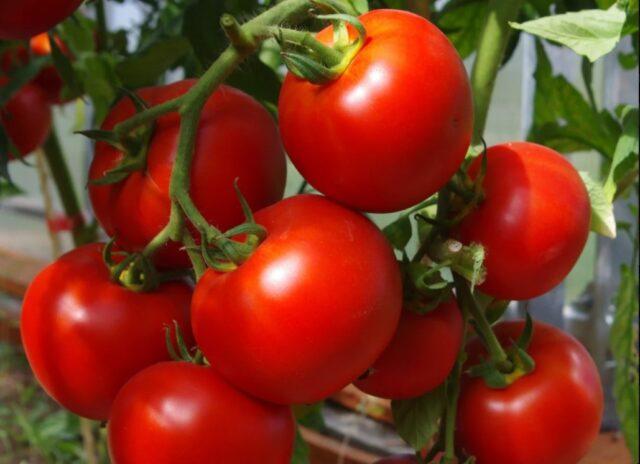
The shape of the fruit is classic for tomatoes, rounded and flattened.
In terms of taste, Sofa tomatoes are noticeably superior to many other varieties with early ripening. They are distinguished by their richness of taste, in which both pronounced sweetness and light sourness “balancing” it are clearly distinguished. These tomatoes can be confused with mid-late or late-ripening varieties and hybrids; outstanding taste is characteristic of such tomatoes.
Characteristics of the Sofa tomato
Based on the description of the originating agricultural company, the Sofa tomato looks very promising.Reviews from gardeners confirm that this information is generally true.
Tomato yield Sofa
During the season, 5-6 kg of fruits are removed from the Sofa tomato bush. Such indicators are provided by frequently forming fruit clusters. The first one is laid over the 6-7th sheet, the next ones - with an “interval” of two sheets. Each bunch contains 5-6 tomatoes.
If the planting scheme is followed, 4-5 plants are placed per 1 m². Accordingly, an amateur gardener can count on a yield of at least 20 kg/m². These are the data of the originator; summer residents who already have experience in cultivating Sofa tomatoes claim that the figures are a little more modest - 3-3.5 kg per bush.
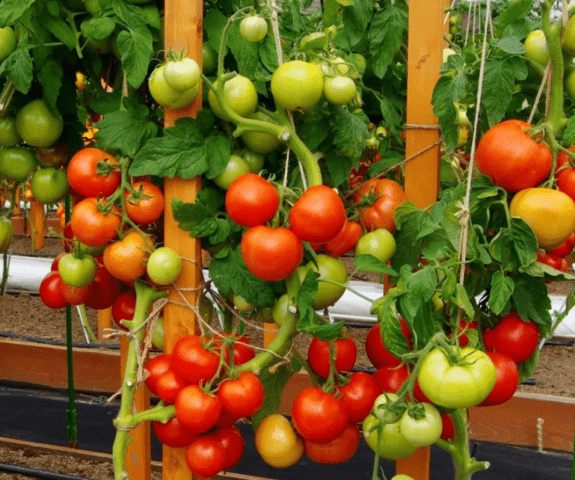
It is possible that the yield of the hybrid depends on the climate in the growing region and the weather during the summer
Resistance to diseases and pests
The hybrid's overall resistance to pathogens is quite good. The manufacturer in the description reports the presence of “innate” immunity to blossom end rot. Gardeners in their reviews mention isolated cases of infection with Alternaria, Fusarium, and various types of mosaic virus.
Methods of application
Thanks to their taste, tomatoes are quite suitable for salads and sliced fresh vegetables, first and second courses. The density of the pulp allows you to prepare tomato paste, ketchups, sauces, freeze and dry tomatoes. Their relatively small size allows them to be used for whole-fruit canning. When salted and pickled, Sofa tomatoes almost do not crack, the flesh retains its texture, and the skin retains its bright color.
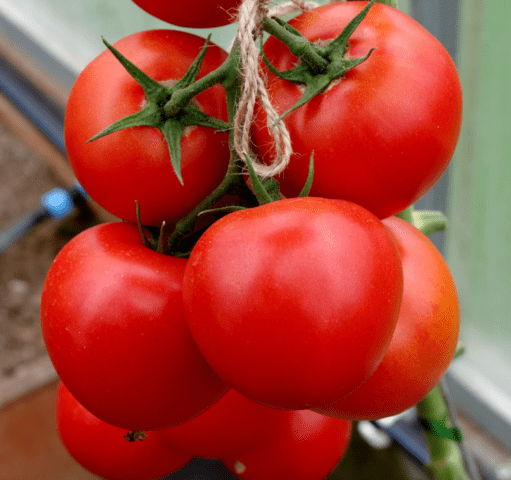
The purpose of Sofa tomatoes is universal
Advantages and disadvantages
The advantages of the Sofa tomato hybrid immediately attracted interest from gardeners who prefer to “test” new selections in their own beds:
- very early fruiting periods;
- massive, “friendly” ripening of tomatoes;
- high productivity;
- “genetically built-in” immunity against blossom end rot and good general resistance to pathogenic microflora;
- possibility of cultivation in open and closed soils, in different climatic conditions;
- compactness of plants, allowing compact plantings;
- no need to form bushes;
- durable skin that provides resistance to cracking of tomatoes, good shelf life and transportability;
- “presentation” and one-dimensionality of tomatoes;
- excellent balanced taste;
- versatility of fruit purpose.

Sofa tomatoes immediately attract attention with their external presentability
Based on the description of the originator, Sofa tomatoes have no obvious disadvantages. Gardeners in the reviews also do not mention significant disadvantages. The only thing that some of them don’t like is the need to purchase seeds every year. In addition, the hybrid is completely new, so Sofa tomatoes are not sold in all stores.
Features of cultivation
The early ripening of the crop allows Sofa tomatoes to be planted with seeds directly into open ground, but most gardeners still prefer the seedling method of growing. Seedlings that have reached a height of 12-15 cm and have 5-6 true leaves are ready for transplanting into the garden bed.
The timing of sowing is determined by the characteristics of the local climate. In central Russia this is approximately mid-March, in the south - the second half of February, in regions with a more severe climate - the very end of March or the first days of April.
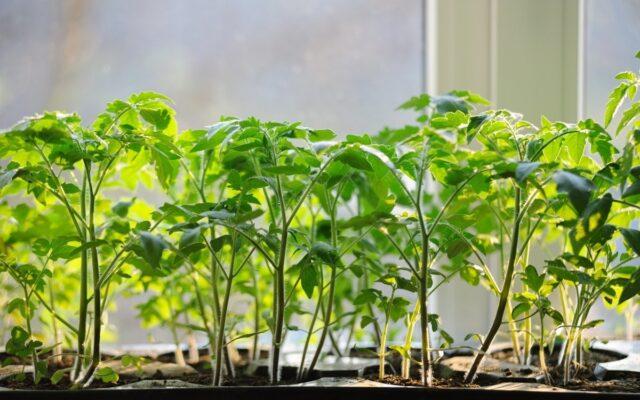
The seedlings reach the “specified” dimensions in 55-60 days from the moment shoots emerge from the seeds (this takes a maximum of one and a half weeks)
It is recommended to immediately plant Sofa tomato seeds in separate containers so that you don’t have to pick them later. It is best to use peat pots - seedlings do not need to be removed from them before planting in the ground.
For the garden bed, choose an open, well-lit and sun-warmed place. The bushes and fruits of Sofa tomatoes do not suffer from its direct rays; they will also tolerate short-term “drought”. Stagnation of water at the roots is much more dangerous for them, so the substrate should be loose, “light”, but at the same time quite nutritious.
The interval between neighboring plants is 35-40 cm, between rows of plantings is 40-45 cm. After planting, the plants are also watered, using approximately 1 liter of water.
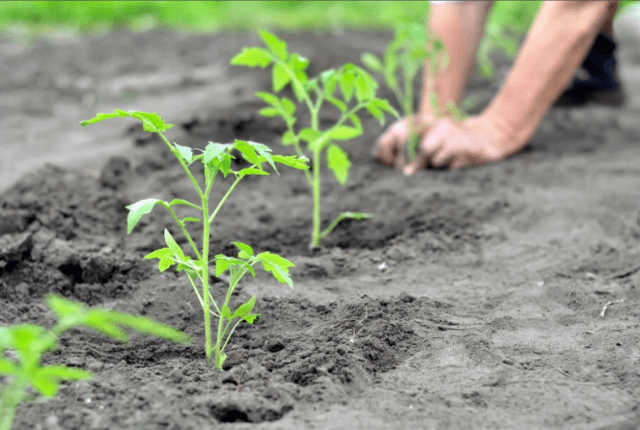
Sofa tomatoes are planted in well-watered holes up to 12 cm deep.
Even an inexperienced gardener can care for these hybrid tomatoes. It includes:
- Watering. The soil is moistened frequently (every 2-3 days), but moderately, spending about 3 liters of water per bush. The surface layer of the substrate should have time to dry during the “breaks”. Of course, when growing in open ground, natural precipitation is also taken into account. The method of watering is not important if it prevents drops of water from falling on the plants themselves.
- Fertilizer application. Due to their high yield, Sofa tomatoes require regular feeding. When preparing a bed, humus and a complex fertilizer containing the main necessary macroelements (nitrogen, potassium, phosphorus) must be added to the soil in the spring.1.5-2 weeks after planting, the bushes are watered with a solution of any mineral nitrogen fertilizer. Then, every 15-20 days, Sofa tomatoes are fed with “specialized” store-bought preparations for tomatoes or Solanaceae.
- Loosening and weeding. They loosen the bushes about once a week and very carefully. The root system of Sofa tomatoes is superficial. In the process, weeds are pulled out. The procedure is carried out the next day after watering. You can avoid these activities if you mulch the tomato bed immediately after planting.
- Stepsonning and garter. Sofa tomato bushes do not require targeted formation; they turn into a standard “tree” with minimal help from the gardener. All he is required to do is remove the stepsons. The plant stems are quite powerful, but the fruit clusters are also massive. Therefore, it is recommended to tie them up to be on the safe side.

The stepsons that are located under the fruit clusters are especially “dangerous” for the future harvest.
Pest and disease control
The resistance to pathogenic fungi in Sofa tomatoes is not bad, therefore, to prevent infections, competent agricultural technology, adherence to the scheme, and pre-planting treatment of seeds with fungicides are sufficient. Before planting, they are pickled for 15-20 minutes in a solution of any copper-containing preparation.
During cultivation in open or closed ground, preventive treatments with the same fungicides at intervals of approximately once every two weeks are recommended if the “activation” and proliferation of pathogenic microflora is established for a long time.The solution is sprayed not only on the bushes themselves, but also on the soil in the beds.

Fungicides effectively destroy any pathogenic fungi
Conclusion
Tomato Sofa F1 is a very promising Russian tomato hybrid. Reviews from gardeners who have tried to grow the new product are mostly positive; the hybrid has not demonstrated any significant shortcomings. The Sofa tomato has proven to be easy to care for, characterized by good immunity and excellent taste.
Reviews from gardeners about the Sofa tomato
